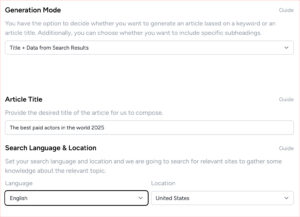In the realm of creative writing, AI’s influence is both intriguing and controversial, offering tools that can enhance how stories are crafted and who gets to tell them. From algorithms that can draft entire novels to AI assistants helping writers overcome writer’s block, the potential for collaboration between human creativity and machine intelligence is enormous.
However, this fusion also raises important questions about originality, authenticity, and the future role of the writer. As we delve into this new frontier, it’s essential to consider both the opportunities and challenges that AI presents to the traditional craft of storytelling.
Overview
In this blog post, we delve into the transformative impact of AI on the future of creative writing. We will explore various facets of this dynamic relationship, providing insights into how AI is reshaping the landscape of literary creation. Here’s a brief overview of what we will cover:
- Understanding AI in Creative Writing: Definition and evolution of AI tools used in writing.
- AI-Assisted Writing Tools: Examination of current AI tools that aid writers, including their capabilities and limitations.
- Enhancing Creativity: How AI can stimulate creativity and provide inspiration for writers.
- Efficiency and Productivity: The role of AI in streamlining the writing process and improving productivity.
- Ethical Considerations: Addressing concerns related to authorship, originality, and the ethical implications of AI-generated content.
- Future Trends: Predictions and future possibilities of AI in creative writing, including potential advancements and challenges.
- Case Studies and Examples: Real-world examples of AI applications in creative writing, showcasing successes and learning points.
- Balancing Human and AI Collaboration: Strategies for maintaining the human touch in creative writing while leveraging AI tools.
By the end of this post, you will have a comprehensive understanding of how AI is influencing creative writing and what the future holds for this evolving field.
Rise of AI in Writing
AI tools have significantly transformed how you can craft and refine your written content. They’ve introduced unprecedented speed and efficiency, enabling you to generate ideas, outlines, and even complete drafts quicker than ever.
This shift isn’t just about speed; it’s also about accessibility. Now, the power to create compelling narratives isn’t confined to those who can afford lengthy writing courses or years of trial and error. Whether you’re a budding novelist or a seasoned journalist, these tools help level the playing field, offering sophisticated suggestions and edits that were once the domain of professional editors.
Moreover, your creative process becomes more dynamic. You’re no longer writing in isolation; instead, you’re collaborating with an AI, pushing the boundaries of your creativity and exploring new narrative possibilities.
AI Writing Tools Overview
AI writing tools offer you a variety of features that streamline the creative process, from automated editing to content generation. These tools can suggest plot twists, develop character arcs, and even craft whole sections of text that you can refine later. Imagine having a virtual brainstorming partner that’s tuned to your style, or a system that helps you overcome writer’s block by suggesting inspiring ideas when you’re stuck.
Beyond just suggesting text, some tools provide thematic and stylistic guidance. They analyze your work for consistency in tone and suggest enhancements to improve readability. Whether you’re drafting a novel, a screenplay, or a poem, these AI assistants offer valuable support, making the daunting task of writing a bit less overwhelming and a lot more fun.
Enhancing Writer Productivity with AI
AI tools can significantly boost your writing productivity by automating time-consuming tasks. They handle repetitive jobs like data compilation, formatting, and basic research, freeing up more time for you to focus on crafting your narrative. You’ll find yourself breezing through what used to be bottlenecks in your writing process.
These tools also organize your notes and references efficiently. Imagine having all your background information sorted and accessible with a simple search, reducing the clutter on your desk and in your mind.
Plus, they can suggest content ideas based on trends, ensuring you’re always a step ahead. You’re not just keeping up; you’re setting the pace.
Embrace these technologies, and you’ll see a noticeable uptick in your productivity, letting you achieve more with less effort.
Impact on Writing Quality
AI tools not only streamline your process but also enhance the quality of your writing. They help you maintain consistency across your work, ensuring that style and tone remain uniform. You’ll find that grammar and spelling checks are far beyond the basic capabilities of previous tools. This technology dives deeper, suggesting more complex sentence structures and richer vocabulary, which can elevate your writing from good to great.
Moreover, AI’s ability to analyze vast amounts of data means you can receive feedback on readability and engagement tailored specifically to your target audience. It’s like having a personal editor who understands both your voice and the needs of your readers, enabling you to refine your drafts more effectively before they ever hit the public eye.
AI’s Role in Content Creation
AI tools empower you to generate content quickly, adapting to various styles and formats to meet diverse audience needs. You’re not just stuck with one type of writing; you can craft articles, scripts, or social media posts with ease. These tools learn from existing data to offer suggestions that might spark your creativity or push your project in a new direction.
Moreover, you can scale your content production without compromising quality, thanks to AI’s efficiency. Whether you’re managing a blog or a massive digital marketing campaign, AI helps you maintain a consistent voice across all your communications.
It’s like having a tireless assistant who’s always ready to bounce around ideas with you, ensuring you’re never at a loss for words.
Ethical Considerations in AI Writing
As you embrace AI in creative writing, it’s crucial to consider the ethical implications of using such technology. You must ask yourself who truly owns the work produced. Is it you, the AI, or the developers behind the AI?
There’s also the issue of authenticity and originality. Are you presenting work that truly reflects human creativity, or are you merely outputting algorithmically generated content?
Moreover, consider the transparency with your audience. It’s ethical to disclose AI’s role in your creative processes. This honesty fosters trust and respects the audience’s right to know the origin of what they’re consuming.
Lastly, think about the potential for AI to perpetuate biases. It’s vital to use AI responsibly, ensuring it doesn’t amplify harmful stereotypes or misinformation.
Challenges Faced by Writers
Writers often face significant challenges when integrating AI into their creative processes. You might find the technology overwhelming, especially if you’re not tech-savvy. Adapting to AI tools requires not only learning new software but also understanding how it can complement your writing style without overpowering your unique voice.
There’s also the risk of becoming too reliant on AI, potentially stifling your creative instincts. You could struggle with the authenticity of the content, questioning whether the heart of your work remains truly yours.
Moreover, maintaining originality becomes a hurdle as AI might generate ideas already widely used or too generic. You need to constantly refine the balance between human creativity and machine efficiency to ensure your writing doesn’t lose its personal touch.
Future Collaboration Possibilities
Despite these challenges, exploring how you can partner with AI opens up innovative avenues for enhancing your creative writing. You’ll find that AI can help brainstorm ideas faster than you can on your own, providing a springboard for deeper exploration and refinement. It’s like having a co-writer who’s available 24/7, ready to pitch in with fresh perspectives or suggest alternatives that hadn’t crossed your mind.
Imagine the possibilities when AI assists in developing complex story arcs or character backgrounds, all while you maintain control over the artistic direction. You’re not just using a tool; you’re engaging in a dynamic collaboration that pushes the boundaries of traditional storytelling. This partnership could redefine creativity, making the writing process more interactive and expansive.
Personalization in Writing with AI
AI can tailor your writing to resonate more deeply with specific audiences, enhancing reader engagement and satisfaction. Imagine crafting a story that adjusts its tone, style, and complexity based on who’s reading it. You’re not just sending words into the void; you’re speaking directly to someone’s experiences and preferences.
This technology analyzes data from reader feedback and trends, allowing you to refine your narratives to better connect with various groups. Whether it’s simplifying language for younger readers or enriching prose for literary aficionados, AI’s customization tools help you hit the right mark.
You’ll see your relationships with readers strengthen as your texts become more relevant and compelling to them, fostering a more dynamic interaction with your work.
AI’s Influence on Literary Genres
AI is reshaping literary genres, enabling authors to explore new narrative possibilities and themes. You’ll find that traditional boundaries between genres such as sci-fi and fantasy are blurring. Imagine stories where AI integrates complex scientific concepts into fantastical narratives, creating a seamless blend that challenges your perception of reality. This isn’t just about adding robots or AI characters; it’s about how these elements fundamentally alter the storytelling landscape.
Moreover, you can now encounter genres like bio-tech thrillers or AI-driven romantic sagas that delve deeper into human emotions through an analytical lens. AI’s role isn’t just to provide new topics; it’s to expand the ways stories can be told, enriching your experience as a reader with layers that were once impossible to weave together.
Automating Editing and Proofreading
AI now automates the meticulous tasks of editing and proofreading, enhancing the precision and speed of refining written content. You no longer have to pore over every word yourself. Instead, sophisticated algorithms analyze your text, catching typos, grammar mistakes, and even style issues.
They’re not just looking for errors; they’re ensuring your writing sounds like you, only better. This technology adapts to your voice, learning to make subtler suggestions that enhance clarity without sacrificing your unique style.
You’ll find that you’re spending less time on tedious revisions and more on the creative aspects of writing. This shift doesn’t just save you time—it also elevates the quality of your work, making sure your final product is polished and professional.
Redefining Writing Processes
AI tools have transformed how you approach the creative process of writing. No longer are you solely reliant on traditional methods like jotting down notes or manual brainstorming. Instead, you’re leveraging AI to generate ideas, develop plots, and even create character outlines at a much quicker pace. This technology enables you to experiment with different narrative styles and structures by suggesting variations you might not have considered.
Moreover, AI’s capability to analyze vast amounts of data means you can incorporate complex research into your stories more efficiently. It’s like having a research assistant who instantly provides relevant information, historical context, or scientific facts, enriching your narratives without the heavy lifting of traditional research. This shift not only saves time but also expands your creative horizon.
Balancing Human Creativity and AI
As you integrate AI into your creative writing, it’s crucial to maintain a balance between your unique human creativity and the efficiency of automated tools. You’re not just harnessing technology to generate content; you’re blending your personal insights and emotional depth with AI’s capabilities. This synergy can enhance your narratives, making them richer and more complex.
Remember, AI tools are here to assist, not replace. They can suggest ideas, improve grammar, and even predict reader responses, but they can’t replicate your personal touch. It’s your voice that makes stories resonate on a human level.
Use AI to handle the mundane, allowing you more space to explore the depths of human experience that only you can express.
Predictions for Writing Industry
Looking ahead, the writing industry will likely see profound transformations as AI becomes increasingly integrated into creative processes. You’ll witness AI tools becoming essential, not just for editing or proofreading, but for crafting narratives and generating ideas. This shift will open doors for you to experiment more freely, reducing the time you spend on repetitive tasks.
Expect a surge in personalized content, as AI hones the ability to adapt writing styles to specific audiences. You’ll find yourself collaborating with algorithms to produce stories that resonate more deeply with readers’ emotions and cultural backgrounds.
However, as the line between human and machine-authored content blurs, you’ll need to stay vigilant in maintaining the unique, human touch that defines compelling storytelling.
How can AI tools help overcome writer’s block in creative writing?
When writer’s block strikes in creative writing, AI tools can provide prompts, generate ideas, and offer fresh perspectives.
They assist by sparking creativity, breaking mental barriers, and guiding you through the creative process.
Will AI ever be capable of writing full-length novels that are indistinguishable from those written by humans?
Yes, AI has the potential to write full-length novels that are indistinguishable from human-written ones.
With advancements in natural language processing, AI can learn to mimic the style, tone, and creativity of human authors.
What ethical considerations should be taken into account when using AI-generated content in published works?
When using AI-generated content in published works, ensure ethical considerations such as proper attribution, transparency to readers, and safeguarding against plagiarism.
Respect intellectual property rights and maintain authenticity in your writing process.
Conclusion
In conclusion, AI is revolutionizing creative writing, offering new tools and possibilities for writers. With advanced algorithms and natural language processing, AI can assist in generating ideas, improving grammar, and even creating entire pieces of content.
While some may fear the automation of creativity, embracing AI can enhance the writing process and inspire innovative storytelling.
As technology continues to evolve, the future of creative writing holds exciting opportunities for collaboration between human writers and AI counterparts.





